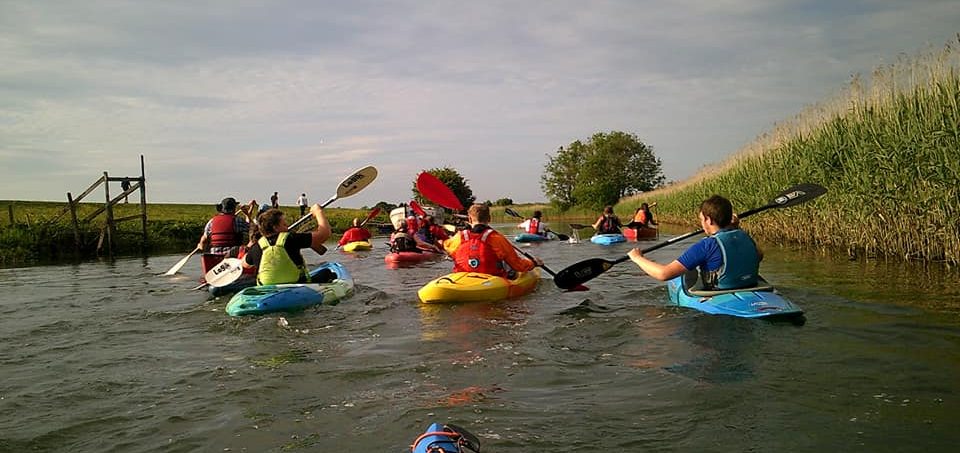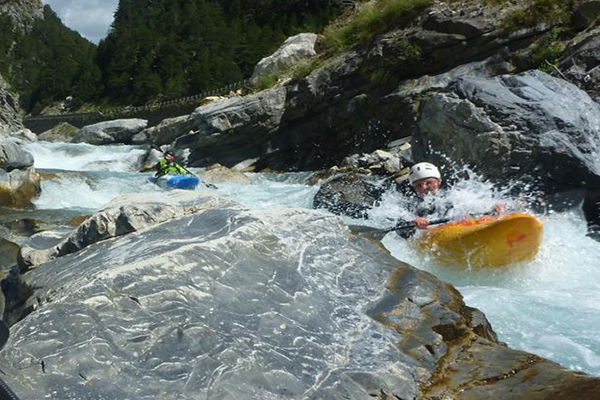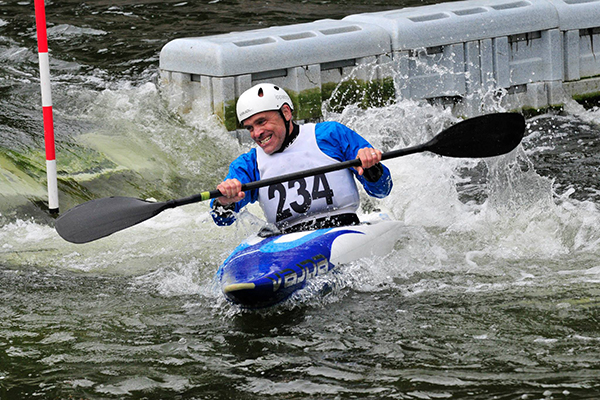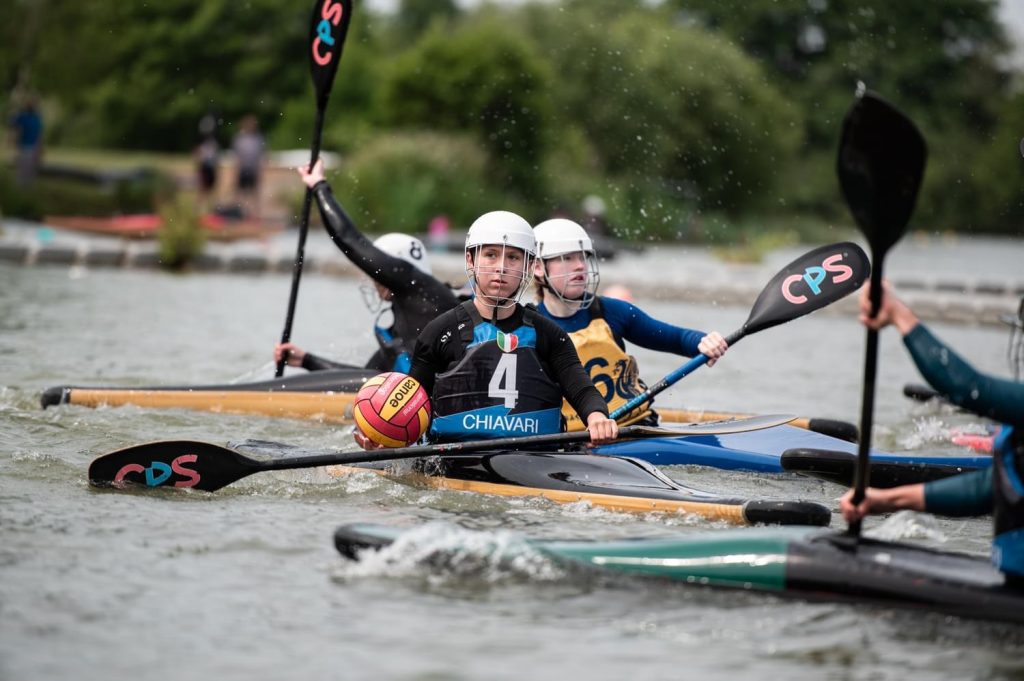Canoeing and Kayaking comes in many forms and can be enjoyed by all ages, from paddling down a simple flat river with friends taking in the scenery and stopping for a picnic, to surfing at the coast, paddling round islands at sea to playing canoe polo, racing down wild water or taking part in canoe slalom – there is something for everyone and paddlers from KKC take part in them all.
Flat Water
A large proportion of our club members enjoy recreational paddling, focusing on non-competitive and enjoyable experiences on the water. We organise various trips to venues suitable for all ages and abilities. Some popular destinations for flat-water paddling trips include the Pocklington canal, Frodingham Beck, and the upper stretches of the River Hull. These locations are suitable for both experienced and inexperienced paddlers.

Caption: Members enjoying recreational canoeing (image for illustrative purposes)
For most of our flat-water canoeing trips, we use general-purpose "plastic" kayaks, as well as canoes and SUPs. The club provides an ample supply of kayaks, canoes, and other equipment available for use during these trips. However, many paddlers become captivated by the sport and eventually decide to purchase their own equipment.
All of our recreational paddling trips are led by experienced instructors who hold qualifications from British Canoeing (BC).
White Water
For many paddlers, white water kayaking is the ultimate thrill and challenge. The Kingston Kayak Club recognizes the appeal of white water and provides opportunities for both competitive and recreational white water paddling experiences.
Competitive White Water: The club actively participates in slalom competitions, which are held on white water courses of varying difficulty levels. These competitions allow our members to showcase their skills and compete against other paddlers.
Recreational White Water: We understand the excitement of exploring white water rivers, and the club organises outings to rivers with varying grades of difficulty. These outings are supervised by highly qualified instructors who ensure the safety and guidance of our paddlers.

Caption: Club members paddling on the River Guil - 2014
Participating in white water paddling not only provides thrilling experiences but also offers opportunities to gain the British Canoeing (BC) Performance Awards. These awards recognise paddlers' skills and competencies, with higher levels requiring proficiency in white water paddling.
Canoe Slalom
Canoe slalom is an exhilarating paddlesport that demands skill, stamina, and courage. The objective is to navigate a rapid river course marked by "gates" quickly and accurately, without touching them.
A gate consists of two poles suspended over the water. Green and white gates are negotiated in a downstream direction, while red and white gates are tackled upstream. Each competitor aims to complete the course with the fastest time, as any contact with the gates incurs a penalty of 2 seconds added to their overall time. Missing or incorrectly navigating a gate results in a significant penalty of 50 seconds, which can be detrimental in serious competition. Each competitor gets two runs down the course, and their fastest run counts.

Caption: Duncan Berriman - Slalom Rep at Interclub Slalom Finals 2015
Canoe slalom competition features five classes: Men's and Women's Kayak, Men's and Women's Canadian Singles, and Canadian Doubles. There are also age-specific classes, including J12 (12 years old and under), J14 (14 and under), J16, J18, U23, Senior, and Vet/Master (35 or over). Registering for age groups in competition can often lead to trophies or medals, as events with a large number of participants often award the highest placed paddler in each category, regardless of their overall placing.
Slalom events take place throughout the spring and summer months, and into the autumn, catering to all levels of ability, on rivers across the UK. These events offer opportunities for paddlers to test their skills, gain experience, and compete against others. For photographs and descriptions of some of the rivers used in canoe slalom, visit the www.canoeslalom.co.uk page.
For current national rankings of the club's slalom paddlers, please visit the UK Canoe Slalom pages. It's a great way to stay updated on the achievements and progress of our club members in the sport.
If you are interested in participating in canoe slalom or want more information, please contact Duncan Berriman. Duncan is our dedicated Slalom Representative and can provide you with further details about training, events, and getting involved in this thrilling discipline of kayaking.
Canoe Polo
Spectators attending a canoe polo match, especially if it's their first time witnessing such an event, are often amazed by the speed and skill of the game. The intensity of the matches and the nature of legitimate tackles can be quite alarming to newcomers. Canoe polo is played by teams of five players, although team squads may have up to eight members to allow for substitutes and other considerations. The primary objective is for teams to pass the ball from player to player, by hand, and score in their opponents' goal while simultaneously defending their own goal.
Caption: Kingston Ladies in action - 2023
In addition to regular matches, the Kingston Kayak Club organises and hosts one of the country's most popular international canoe polo tournaments, the Joy Davis Hull International. This exciting event takes place annually at Dacre Lakeside Park, Brandsburton. The tournament benefits from this excellent venue, with ample camping for competitor, refreshments and restaurant on site.
For more information about canoe polo and the tournaments organised by the Kingston Kayak Club, please contact Lee Busby or Lesley Medina.
Marathon
Marathon competition is conducted in divisions; the lower divisions can use any sort of kayak (or canoe in canoe classes) but higher divisions use specialised marathon boats, long, narrow and VERY unstable when stationary! Kayaks can also be single (K1) or double (K2) and occasionally even K4; marathon canoes are also narrow and involve the paddler kneeling on one knee whilst paddling with a single-bladed paddle; again, classes are held for C1 and C2.
Bell Boats
Kingston Kayak Club has two bell boats. If you would like more information on bell boats see the BCU website or download KKC's press release on the subject.
The club encourages paddlesport through these boats. They would be ideal for Scouts / Guides as they can take up to 14 youngsters. Scout / Guide leaders would need to hold a helm certificate. The Club has plans plan to arrange one locally. This course would be over two days.
Sea Kayaking
Kingston Kayak Club, based in Hull, is only half-an hour's drive from the sea, and for those members living to the east of the city even less, so it is not surprising that some of them take part in sea kayaking and canoe surfing.
One or two club members have real sea kayaks - long, stable kayaks with closed-in decks, extra buoyancy plus storage space and deck lines - but the majority paddle their general-purpose kayaks.

